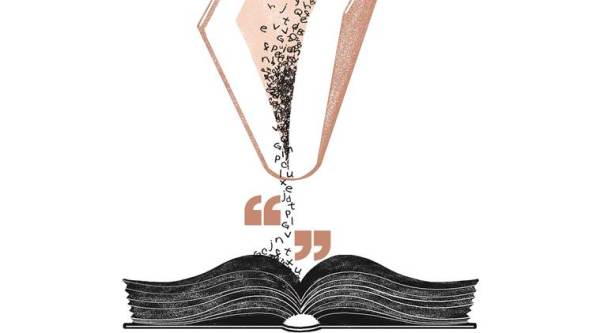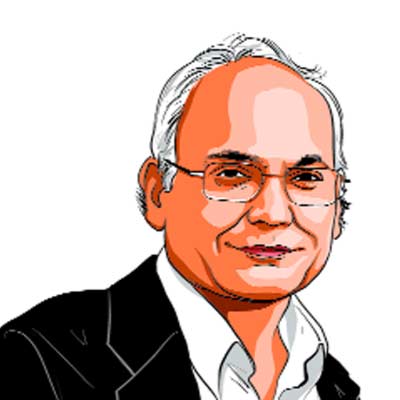My books, my truths
My work reflects the lived realities of marginalised communities. A methodology that depends on secondary data cannot do justice to first-hand knowledge

Historically, books are products of two kinds of quests: One, the search for knowledge and two, revisiting already codified knowledge. (Illustration; C R Sasikumar)
A member of the Delhi University’s Standing Committee for Academic Affairs, among the teachers who demanded that three of my books be removed from the university’s curricula, argued that “Ilaiah’s understanding of the Hindu faith is wrong and there is no empirical data to establish his understanding”. Let me refer to three of my books: God As Political Philosopher: Buddha’s challenge to Brahminism, Why I am Not a Hindu: A Sudra critique of Hindutva philosophy, culture and political economy and Post-Hindu India: A discourse on Dalit-Bahujan socio-spiritual and scientific revolution.
The first book evolved out of my PhD thesis on ancient Indian political thought; hence it is well referenced and has a lot of citations. The other two books — they have been questioned by Delhi University’s committee — are full of data pertaining to Dalit-Bahujan, upper Shudra, Adivasi and Brahmin-Bania communities, largely from the Telugu-speaking region. They are about lived realities, work, instruments, culture and social relations. They are products of years of field work and are not referenced for sound methodological reasons.
Historically, books are products of two kinds of quests: One, the search for knowledge and two, revisiting already codified knowledge. In ancient times, such quests were of two types. One pertained to spiritual issues. Such texts focussed on god. The Bible, Vedas and Quran are good examples of such literature.
The other kind of literature was produced by people who looked for knowledge in their own milieu and in other environments. First-hand information about peoples’ lives cannot draw from other books for the simple reason that there were none at all. Such knowledge can be verified by revisiting the subjects and sources.
Plato’s Republic and Aristotle’s Politics do not have modern-style references from other works. In India, the first ever social science writing of this kind was done by Kautilya. Hence, the Arthashastra does not have a reference list. Even Manu’s Dharmashastra was written in a similar manner. Such a search for knowledge, in my view, leads to the production of foundational texts.
Referencing and quoting other works is a modern practice. It evolved in the post-Renaissance times. The re-search method either borrows ideas from other literature or combines field work — empirical data collection — with an analysis of other texts. Scholars from the West re-searched the knowledge of peoples, classes and races and this endeavour led to the production of referenced literature. But even in the West, post-modernist writing has reverted to the method of not using quotes.
Books that are based on information about people’s lived experiences — habits, social relations, imaginations, food culture, even philosophy — have changed the way knowledge is constructed. Such works do not rely on quotations.
Modernist scholarship — the so-called nationalist and Marxist schools — and Hindu fundamentalist academicians do not accept the post-modernist search method. According to them, to be eligible for a PhD degree, a work should rely on the modernist re-search method. The Hindutva academic school is the most backward of them. This school recognises books that cite the Vedas, Ramayana, Mahabharata, Arthashastra, Dharmashastra, V D Savarkar’s Hindutva:Who Is a Hindu, M S Golwalkar’s Bunch of Thoughts and so on. The others, of course, insist on quotations from multiple sources.
I confronted a major methodological problem during the anti-Mandal agitation in the 1990s. How to defend reservations? There was no quotation-based literature to defend reservation. At that time, Indian Marxists quoted from the writings of Marx, Engels, Lenin, Stalin and Mao. I departed from the citation-based methodology and wrote an article in the Economic and Political Weekly, “Reservations: Experience as a Framework of Debate”. That piece made many anti-reservationists re-think their positions.
I then realised that one cannot draw on written texts to learn about the history, culture and lived experiences of the Shudras, OBCs, Dalits and Adivasis. The Vedas, epics such as the Ramayana and Mahabharata and the writings of Kautilya and Manu do not reflect the knowledge of these people. Modernist works also did not do justice to such knowledge. My first major attempt to bring such knowledge to light led me to write, Why I am not a Hindu. Shashi Tharoor’s Why I am a Hindu adopts a diametrically-opposite method — it draws from several other books. Hence, there is no original statement in that book.
Post-Hindu India draws on a much more rigorous collection of information from Adivasis, Dalits, OBCs and upper Shudras as well as Banias and Brahmins. It tries to deal with every major community. I could not re-search about their instruments, skills, proverbs and philosophy and past by drawing on secondary data. I had to do first-hand work in villages. For theoretical justification, I did not quote anybody because no one has done work on these people.
I formulated my theoretical positions in much the same way as Plato, Aristotle or Kautilya. Like these savants, I was also not unbiased. What many academicians do not understand is that the caste compartmentalisation of Indian society has not allowed a holistic construction of knowledge about the country. We have not been good at experimenting with newer ways of writing and building knowledge. Universities have to do that.
My training in a regional university allowed me to retain a productive association with several communities. I have been an activist, apart from a being a teacher. This is an area where the nationalist, Marxist and Hindu fundamentalist schools of academicians have, unfortunately, failed us. A scholar conducting such experiments at the PhD level is unlikely to get a degree. That was why I used the traditional method to write my PhD.
The intellectuals from the RSS/BJP do not want the political philosophy of Gautam Buddha to be taught in our universities. There is no codified political philosophy of Sri Ram. There is some philosophy of Sri Krishna in the Bhagvad Gita but that has to be examined from the point of view of the agrarian producers — not the priest and politician.
Universities are meant to be breeding grounds for change. The discovery of new methods of writing should come from them. They should not be fearful of change. All those who oppose my books must read them and tear them apart in their writings. That will help students.
The writer is director, Centre for Study of Social Exclusion and Inclusive Policy (CSSEIP) at Maulana Azad National Urdu University, Hyderabad
For all the latest Opinion News, download Indian Express App
More From Kancha Ilaiah Shepherd
- Notes from the CPM congressA politics based on democratic welfarism could offer a political alternative. The Bahujan Left Front in Telangana comprising communists and Ambedkarites may show the way...
- Exception makes the ruleApex court verdict will make the SC/ST Atrocities Act toothless, roll back social transformation..
- To Be or Not to BeIn Hinduism, the right to spiritual equality is restricted. In glossing over the fact in his new book, Shashi Tharoor is playing into the hands…







































No hay comentarios:
Publicar un comentario